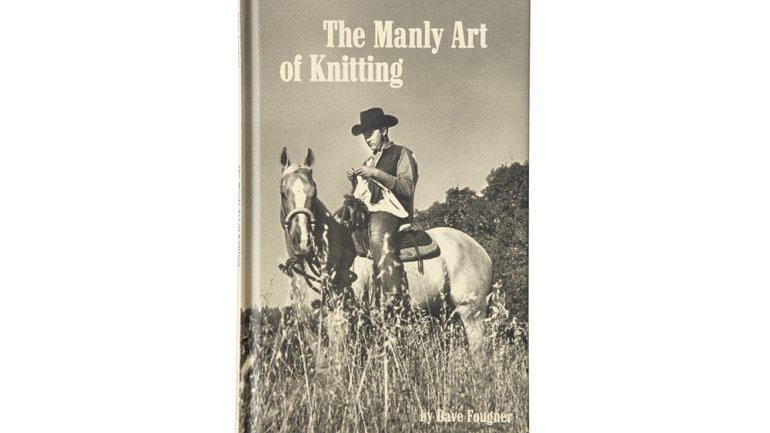The Long View
The Long View
The Manly Art of Knitting
By Dave Fougner
Ginkgko Press, $14
The cover image says it all: Comfortably seated on his horse, with a cowboy hat shading his eyes, author Dave Fougner is absorbed in his knitting (although his horse is paying attention to the photographer). Originally published in 1972, The Manly Art of Knitting is a timely re-release; recent museum exhibitions have celebrated makers who are challenging traditional gender divisions in craft. But this cult classic also stands the test of time: Photographs of manly hands, enhanced with neatly drawn diagrams, clearly illustrate techniques, while specific stitches, often relegated to “the seemingly foreign language” of project instructions, are described without abbreviations and feature high-contrast close-up photography.
No review of this book can be complete, however, without admiring the projects, from dog bed to hammock to horse blanket. The hammock is knitted on shovel handles or pool cues. As for the horse blanket: “If you don’t have a horse, this project will make a good throw rug.” ~Dulcey Heller
History of the World in 1,000 Objects
By the Smithsonian
DK Publishing, $50
It’s known as “America’s attic,” but in History of the World in 1,000 Objects, the Smithsonian sets its sights on all of humankind – using the things we made as evidence of who we were and what we did. In this tome of human history, objects from museum collections around the world are organized in rough chronological order, providing a conventional look at our past, from ancient societies to recent technological advancements. The objects include the mundane and sublime, from plumbing pipe to Michelangelo’s Pietà, and are arrayed handsomely by culture, time, and topic. But don’t presume exhaustive explanation of individual items or nuanced interpretation of historical events; with millennia to cover, brevity is only to be expected. ~Perry A. Price
Bauhaus Weaving Theory: From Feminine Craft to Mode of Design
By T’ai Smith
University of Minnesota Press, $90
Intellectual rigor often goes hand in hand with the Bauhaus, a school as famous for its approach to design as it is for the range of arts and crafts talent it influenced. Yet analysis of Bauhaus theoretical writings has largely ignored the texts that emerged from the female-demarcated weaving workshop.
No more. Ninety years after Anni Albers wrote her first analytical essay “Bauhaus Weaving,” T’ai Smith’s Bauhaus Weaving Theory demonstrates how the school’s weavers grappled with gender, material, and modernity, and how the fields of photography, painting, and architecture informed their artistic practice. An assistant professor at the University of British Columbia, Smith makes a compelling case, drawing on historical context and insightful excerpts from the artists’ texts. The result is an edifying and overdue investigation of the weavers’ far-reaching contributions. ~Jessica Shaykett

